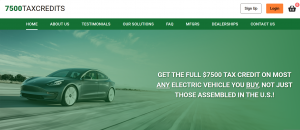ARTICLE AD BOX
An estimated $3.75 billion in EV tax credits left on the table last year.
— 7500TaxCredits Founder Bruce Collet
SALT LAKE CITY, UTAH, UNITED STATES, March 19, 2024 /EINPresswire.com/ — A new electric vehicle (EV) Buying Loophole has been identified, researched and solutions documented on https://7500taxcredits.com/.
has been identified, researched and solutions documented on https://7500taxcredits.com/.
The Buying Loophole allows anyone (not just those under the $150k/$300k income limitations) to buy (not just lease) almost any EV(not just those assembled in the U.S. and with sufficient U.S. content) and get the full $7,500 tax credit plus thousands in tax and other savings (how and why is documented in the solutions described below).
“The Buying Loophole has the potential to re-ignite a sluggish EV market, reduce the total cost of ownership, and increase buyer satisfaction,” said 7500TaxCredits founder Bruce Collet. “Anyone even thinking about buying or leasing an EV should check this out. We estimate that 500,000 EVs were sold last year, and buyers could have been eligible for the full $7,500 in tax credits using this approach but received none—that’s $3.75 billion left on the table. The “leasing loophole” is a windfall for lessors. The Buying Loophole benefits EV buyers.”
An EV consumer’s current options to benefit from the $7,500 tax credit are to:
a. Purchase an eligible U.S. assembled electric vehicle (a lot of restrictions, frequent eligibility changes, and, as of March, about a dozen eligible for $7,500 credit) or
b. Lease any other EV on the market and get as much credit as the lessor is willing to give, typically called the “leasing loophole.” Many EV customers don’t like leases with all of the associated costs and restrictions (they aren’t building equity, have limited miles, could have to pay for dings and scratches, the lessor gets the tax credit and may or may not pass part or all of it on, etc.)
Now, the EV Buying Loophole , a third patent-pending option, eliminates the purchase restrictions and is less costly than the “leasing loophole.” The “Loophole Solution”, available on the 7500TaxCredits website, describes how and why this approach works, the IRS safe harbors and is available free thru April 15th using the coupon code “launch”. Buyers with tax or legal backgrounds may be able to use this approach just given the concept.
, a third patent-pending option, eliminates the purchase restrictions and is less costly than the “leasing loophole.” The “Loophole Solution”, available on the 7500TaxCredits website, describes how and why this approach works, the IRS safe harbors and is available free thru April 15th using the coupon code “launch”. Buyers with tax or legal backgrounds may be able to use this approach just given the concept.
For those wanting more assistance, 7500TaxCredits has created an “Implementation Solution” that includes more comprehensive citations, references, examples and a step-by-step outline to help EV buyers navigate the process and avoid potential pitfalls. They have also developed a Microsoft Excel financial model allowing buyers to see the estimated results (income/loss and cash flow) for a sample purchase, and after entering their own unique data. The 7500TaxCredits proprietary Implementation Solution and financial model will save buyers (and their professional advisors) time, research effort, and money.
How is the Buying Loophole different than an individual purchase or lease?
1. Buyers can purchase multiple EVs with full credit on each purchase instead of once every three years.
2. There are no buyer income limits, the $150k individual or $300k couple income restriction is gone.
3. There are no price restrictions, $80k+ SUVs and $55k+ sedans are eligible.
4. The total $7,500 tax credit goes to the buyer (versus to the lessor) and U.S. vehicles that are only partially eligible usually get the full tax credit.
5. Buyers can carry the tax credit forward. This was an advantage for buyers that don’t have a tax obligation of $7,500 or greater; but as of January 1, buyers can get immediate credit.
6. There are no vehicle battery assembly and content chemical sourcing restrictions.
7. It can be implemented through the buyer’s dealer of choice.
8. There may be tax and other savings that can equal or exceed the tax credit.
Background: The Inflation Reduction Act of 2022 authorized $7,500 in tax credits for electric vehicles (EVs) purchased from 2023 through 2032. There are numerous U.S. content requirements and buyer restrictions. The Act also authorized the credit for buying commercial vehicles without consumer restrictions. The IRS issued rulings that a lessor’s purchase of a vehicle to lease to a consumer constituted a commercial sale, eligible for the tax credit (see Topic G at https://www.irs.gov/pub/taxpros/fs-2023-22.pdf for a full description.) “This has been labeled as the “leasing loophole” in the EV industry, has been extensively written about and has driven the % of leased vehicles from low historic levels to over 40% in the last year, forecast by some to hit 60% this year. “ said Collet. “The 7500TaxCredits approach will be attractive to the next 500,000+ buyers who won’t otherwise get any tax credits and those reluctant lessees who lease solely to be eligible for the credit but would much rather purchase.”
About the Founder
Bruce Collet is a retired Fortune 500 consultant, entrepreneur and corporate executive. His consulting experience includes 20 multi-month (usually 6+) strategic projects in a variety of industries. Executive experience includes a 5 year turnaround of a public manufacturing company, running a $230 mil/yr finance business and taking a small manufacturer from $1 to $10 million in a year. He has a long list of entrepreneurial activities – one in alternative energy particularly relevant to this business – he spent 3 years developing a practical strategy for converting gasoline vehicles to run on both gasoline and CNG (Utah converted more vehicles to CNG than the rest of the country combined during this period). $10 mil in anticipated funding collapsed when gasoline went from $5/gal back to under $3, CNG tripled in price and most tax credits were eliminated. He has a BS in Computer Science from Utah State University and a Masters in Accountancy from the University of Illinois. He spent the first 5 years following graduation in the consulting division of Arthur Andersen and Co (now Accenture).
Company contact: Bruce Collet cbc@7500taxcredits.com
Media contact:
David Hill
7500TaxCredits
+1 801-505-8172
dchill32@hotmail.com
![]()
The content is by EIN Presswire. Headlines of Today Media is not responsible for the content provided or any links related to this content. Headlines of Today Media is not responsible for the correctness, topicality or the quality of the content.
The post New Electric Vehicle (EV) Buying Loophole™ Expands Eligibility for $7,500 EV Tax Credit appeared first on Headlines of Today.
.png)
 7 months ago
5
7 months ago
5










 English (US)
English (US)